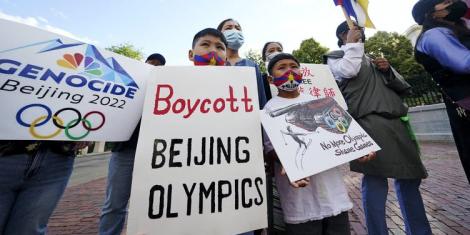
U.S. government officials will boycott the 2022 Winter Olympics in Beijing because of China's human rights "atrocities", the White House said on Monday December 6th, just weeks after talks aimed at easing tense relations between the two superpowers.
The diplomatic boycott, which leaves athletes free to travel to Beijing to compete, has been encouraged by some members of Congress and rights advocacy groups for months.
Beijing threatened unspecified "resolute countermeasures" against any such move before Monday's announcement, which is certain to further strain relations already at their lowest point in decades.
President Joe Biden's administration highlighted what Washington says is genocide against minority Muslims in China's western region of Xinjiang. China denies all rights abuses.
"U.S. diplomatic or official representation would treat these games as business as usual in the face of the PRC's egregious human rights abuses and atrocities in Xinjiang, and we simply can't do that," White House press secretary Jen Psaki told a daily press briefing, referring to the People's Republic of China.
"The athletes on Team USA have our full support," Psaki added. "We will be behind them 100% as we cheer them on from home." The move comes despite an effort to stabilize ties with a video meeting last month between Biden and China's leader Xi Jinping.
China's embassy in Washington called the boycott "political manipulation" that would have no impact on the Games as no invitations had been extended to U.S. politicians.
Canada's foreign ministry said it "remains deeply disturbed by the troubling reports of human rights violations in China" and is continuing to discuss the matter "with our partners and allies."
The Australian and Japanese governments said they were also still considering their positions for the Games, which begin on February 4th 2022.
"We will consider matters such as the meaning of the Olympic Games and our diplomatic relations, and would like to make our own decision based on what is best for our national interest," Japan's Prime Minister Fumio Kishida told reporters.
New Zealand Deputy Prime Minister Grant Robertson said his country would not send government officials but that decision was based largely on COVID-19 concerns and preceded the U.S. boycott.
